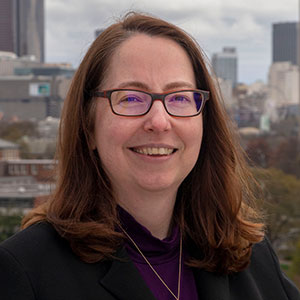Published: February 1, 2021

The COVID-19 impact on airlines has been profound, with more than a 50% decrease in the volume of air passengers over the past year.
Last year, in the early days of the pandemic, I shared an episode featuring Arnie Barnett with MIT in which we discussed how by leaving the middle seats on airplanes open, and only filling windows and aisles, the chance of contracting the coronavirus during a flight could be significantly reduced.
Now, joining me for this episode to discuss additional ways airlines have pivoted and adapted to the challenges of the pandemic is Laurie Garrow. Laurie is co-director for the Center for Urban and Regional Air Mobility, professor at the Georgia Institute of Technology, president of AGIFORS, a non-profit organization dedicated to the advancement of operations research within aviation and an INFORMS Certified Analytics Professional.
Financially, we are not expecting to see a return of demand to pre-COVID levels until probably 2023 to 2025. Of course those forecasts are changing daily, but that’s the current expectation. Many airlines have noted that they’re going to emerge smaller, with more streamlined operations and fewer fleet types, which should improve air efficiency. There is a general sense that I’m seeing in the industry that the flexible ticketing requirements – meaning no cancellation penalties – are here to stay. So this is good for the customer because it means that they will have added flexibility after the pandemic, but it also means that many of our RM demand forecasting and optimization approaches will need to change. Finally, the aircraft grooming procedures are here to stay, and both airports as well as aircrafts will be much cleaner moving forward.
Interviewed this episode:

Laurie Garrow, CAP
Center for Urban and Regional Air Mobility, Georgia Institute of Technology, and president of AGIFORS
Professor Laurie Garrow’s research addresses the development and application of advanced models of travel demand that integrate discrete choice, econometric, and market research methods to enhance understanding of travel behavior. Dr. Garrow earned her Ph.D. in Civil Engineering at Northwestern University, with an emphasis on travel demand modeling and airline passenger behavior. Her dissertation won first prize in the 2004 INFORMS Aviation Applications Section and honorable mention in the 2004 Eric Pas dissertation competition sponsored by IATBR. In 2013, she received the prestigious ASCE Walter L. Huber Civil Engineering Research Prize “for development and integration of advanced discrete choice models of traveler behavior into airline planning, scheduling, and revenue management decision support systems.” She is the 2009 recipient of the Council of University Transportation Centers-American Road & Transportation Builders Association (CUTC-ARTBA) New Faculty Member Award, one of the most prestigious awards given to an untenured faculty member in transportation that recognizes research and teaching contributions. Her teaching contributions have been recognized via the institute-level award, namely the CETL-BP Junior Faculty Teaching Excellence Award. She is the recipient of a CAREER award that was jointly funded in 2009 by two programs at NSF – the Decision, Risk and Management Sciences Program and the Service Enterprise Systems Program.
Dr. Garrow has published articles on airline passengers’ behavior, discrete choice methods, and travel demand modeling. She is author of a text published by Ashgate entitled Discrete Choice Models of Air Travel Demand: Theory and Application. Among her leadership Dr. Garrow served as President of AGIFORS, Vice President of Societies and Sections on the Board of INFORMS, President of the Transportation Science and Logistics Society of INFORMS, Chair of the Aviation Applications Section of INFORM, co-chair of the Emerging Methods Subcommittee of the Transportation Demand Forecasting Committee of TRB, and a Board Member of the INFORMS Revenue Management and Pricing Section. In October of 2020, Dr. Garrow was elected to be President of AGIFORS for a second term, making her the first woman, first academic, and first person to serve two terms of President in AGIFORS’ 60-year history. Dr. Garrow has five years of industry experience, including four years as an analyst in the Research and Development Revenue Management Group of United Airlines and one year as an analyst in the Customer Science Unit of Mercer Management Consulting.
In the past 16 years, Dr. Garrow has worked with 11 Ph.D. and 22 M.S. students. Five of her students were awarded NSF Graduate Research Fellowships and one was awarded a $69,500 Eisenhower Fellowship. Five of her students have participated in the Eno Leadership Development Conference and six of her students have won $10,000 scholarships as part of the Airport Cooperative Research Program’s Graduate Research Award Program.
Episode Transcript
Contact us to request transcript.
Want to learn more? Check out the additional resources and links listed below for more information about what was discussed in the episode.
Georgia Tech Center for Urban and Regional Air Mobility
“The first 100 days: How airlines responded to the COVID-19 crisis,” Avionics International
“Despite CDC guidance, will Georgians travel this holiday season?” WABE
Tags: airlines, COVID-19, Laurie Garrow
